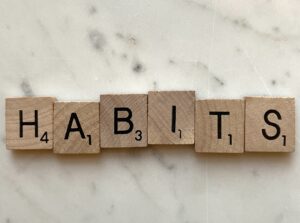 I’m a huge fan of creating beneficial habits. When you have a habit going, it becomes automatic–at least for awhile! And when that happens, life gets easier. (You might enjoy listening to Episode 22 of the podcast I co-host, Getting to Good Enough, called Creating Helpful Habits.)
I’m a huge fan of creating beneficial habits. When you have a habit going, it becomes automatic–at least for awhile! And when that happens, life gets easier. (You might enjoy listening to Episode 22 of the podcast I co-host, Getting to Good Enough, called Creating Helpful Habits.)
I got to thinking about the genealogy habits that benefit me and four jumped to mind. Your future self will thank you if you do these four things every time you research:
- Rename the files you download. Having a consistent file-naming protocol will help make sure you don’t lose valuable documents on your hard drive. (See this blog post if you’re interested in my file-naming protocol and folder structure.)
- Process each document right after you download it. By process, I mean extract all the data from it and enter it in your genealogy software. Be sure to create a source citation (see #3 below). If you do this, you won’t have an ever-present backlog of unprocessed documents nagging at you. And you get to further your research!
- Create a source citation for every document and assign a source to every fact. In my genealogy life no fact goes into my database (I use Reunion) without a source citation. That’s how I know I can trust my research. (And so can other people.)
- Log your research during each session or, at the very least, write out your next steps. It is so useful to be able to pull up your research log and see where you left off. It eliminates that overwhelming question, “What should I research today?” (Here’s a post on my very informal research log.)
The good news is that while these habits are important, they’re not hard. I encourage you to work on creating great genealogy habits. It can take some of the frustration out of the research process. You want your genealogy research to be as frustration-free as possible!
For detailed information on how I organize my own genealogy research, check out my Orderly Roots Guide, How I Do It: A Professional Organizer’s Genealogy Workflow, available for $19.99.

These are grest habits. The source citations would bog me down. Now I keep a template for the various sources to help simplify the process.
Mary, templates are great! I use templates in Reunion to create my source citations so it’s not a hard at all.
I have many, many unprocessed items for many, many surnames. Any suggestions on attacking this problem? Do I stop looking for new information? This would be difficult for me as I have found some new surnames and info on surnames I already know about that I want to explore.. Or should I start now following your suggestions on current and future research?
Sharon, I sometimes build up a big backlog (big for me anyway) and then decide to focus on it. I find it helpful to have a spreadsheet that allows me to track my progress on reducing the backlog. (You can see a picture of it here…it was part of a 30 x 30 challenge so I was also keeping track of how much time I spent each day: https://organizeyourfamilyhistory.com/keeping-track-of-my-backlog-busting/. )
Any overwhelming project can be made less overwhelming by breaking it down into small bites. I can totally understand not wanting to give up searching while you focus on the backlog. One thing I sometimes try is to make sure I process at least as many documents as I download, so I don’t grow my backlog at all.
I think it’s a good idea to start following my suggestions for your current research and going forward. But if you have documents that you’ve downloaded but not analyzed, you might want to consider figuring out a less-overwhelming way to process the backlog so that you’re benefiting from your prior research. Maybe you pick a surname or family group and focus on those documents and process one document a day.
I hope that’s a little bit helpful!